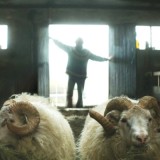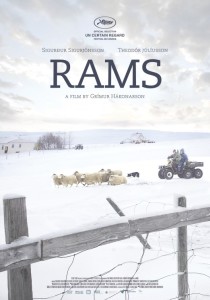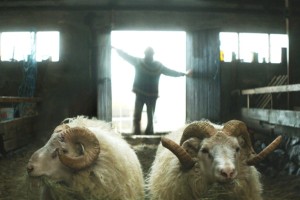
Movie Review: Rams
What We Liked
What We Didn't Like
Ultimately, it is unsurprising the love between estranged brothers at the heart of an isolated farming community in Iceland, so, at the heart of this film, is a strong one, disguised in a vehement stalemate where neither has spoken to the other in forty years. You wonder briefly where this schism comes from, but get swept into the emotional drama of both men losing their livelihood, a loss that asserts itself as a foil for their estrangement. Rams (Hrútar) can be bleak if you fast forward and pause in chunks, but reveals a vulnerable humanity punctuated by on-location natural beauty. Not since Midnight Cowboy perhaps, have I felt a brotherly love so wrapped in tactile closeness.

The brothers are neighbors and each lives alone (Kiddi in their childhood house). They send messages through a sheepdog, who they seem to share ownership of. How much they love their messenger juxtaposes the tensions they transfer between themselves, conveying the lived-in paradox for people involved in these types of feverish bonds. This relationship is summed up in a splendid visual scene when one morning Gummi finds Kiddi unconscious in the snow, having drunk himself to sleep. Following Gummi by long shot across the bridge that connects the farmlands to the town and framed by the sun rising, Gummi picks him up with his tractor claw and takes him into the commercial center. He drops Kiddi in front of the emergency room entrance, never getting out of the truck or saying a word to the medical staff.
Humor is deployed in a Coen brothers sort of way, dry and to the point. After news of the disease, Kiddi says the veterinarians might as well slaughter the farmers, too. A friend remarks, “It is f*cking boring [here].” Apart from caring for their animals, there is nothing for these folks, and even animalistic are their behaviors – Gummi cuts his toe nails with a hugely scary scissors and in a glorious, slightly discomfiting scene on Christmas, dresses up for the occasion of his ram impregnating the ewes. Gummi’s attachment to his sheep is indiscernible from the sense of ownership and pleasure he takes (or not) in his own existence. The trust between man and animal is the point of this moment, communicating the poignancy of life cycle, rebirth, and legacy.

Thankfully, writer/director Grímur Hákonarson does not take us there, and it is much better this way. We do not need an explanation to fully understand a story of two brothers. Hákonarson reflects that all close families experience conflict, and for this reason, Rams has universal meaning. When Gummi deposits his brother in front of the hospital, it is the most important of gifts he gives Kiddi – his life and, knowingly or not, he is ensuring their survival.
Dina Paulson-McEwen
Latest posts by Dina Paulson-McEwen (see all)
- Interview with Hannes Holm, writer/director of A Man Called Ove - April 15, 2017
- Unknown Pleasures and Paul Thomas Anderson’s Junun in Berlin - July 3, 2016
- 10 Best Things About the 2016 Oscars - March 1, 2016


